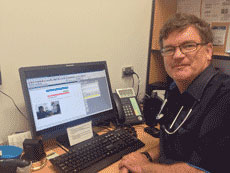Telehealth enhances rural healthcare

October 2014
Opotiki GP and Chair of the Rural GP Network, Dr Jo Scott-Jones believes that telehealth can radically improve the way rural GPs care for their patients by offering them new services closer to home.
Telehealth can also give GP's the necessary professional development, they often can’t access in a small town.
In his own practice, Dr Jo Scott-Jones has been using technology for years to enhance the services his Church Street Surgery can offer patients.
“We have always been a practice that keeps up to date with technology, whether it’s having regular updates to software and hardware or being an early adopter of using ACC forms and HealthLink online.”
This use of technology was the reason why Ernie Newman, a facilitator from the Telehealth Demonstration project approached Jo about being a lead clinician in the Opotiki Telehealth trial, which has now become business as usual. The video equipment and training were provided by the project which is supported by the Bay of Plenty District Health Board, the National Health IT Board and the Ministry of Business, Innovation and Employment.
Jo says, “We now have video cameras and Jabber software is installed on all the practice computers and this equipment is being used in several ways. All the GPs in Opotiki have this equipment installed.”
Telehealth as a training tool
“We first started using it as a training tool, to observe each other’s consultations and then for trainee nurses and registrar’s consultations. Having a camera means that you can observe the consultation closely without interrupting the interaction between the staff member and patient.”
Jo says that a neighbouring practice, a kilometre away, also has video conferencing equipment. “We have been using the equipment to access remote education sessions. We had some after-hours sessions for the whole community health team from Mobile Health Solutions which enabled education experts, at a distance, to talk to a group of clinicians.”
“Having this technology and broadband is a great opportunity for rural practices to get an education without going out of town. It is fifty kilometres to Whakatane Hospital so to get there and back for a training session takes you away from the practice for half the day.”
“It’s also is an opportunity to bring colleagues working in the same geographical area together. We are constantly looking out for worthwhile tele-education opportunities. We have accessed webinars on suicide prevention and Maori Health.”
Telehealth after-hours service
Jo says that the after-hours care in Opotiki has been greatly enhanced by the use of video conferencing equipment.
 “We have a nurse on duty at the cottage hospital that can triage patients. I live 25 kilometres out of town and previously the nurse would ring me about a patient if I was on call. Now with video conferencing equipment at home, I can use the camera to support the face to face consultation. I can see the rash if a patient has one or the distress shown by the patient’s body language. It boosts the patient’s confidence in the way they now receive healthcare.”
“We have a nurse on duty at the cottage hospital that can triage patients. I live 25 kilometres out of town and previously the nurse would ring me about a patient if I was on call. Now with video conferencing equipment at home, I can use the camera to support the face to face consultation. I can see the rash if a patient has one or the distress shown by the patient’s body language. It boosts the patient’s confidence in the way they now receive healthcare.”
“Previously, I would advise more patients to go to Whakatane Hospital. Now I can see them, any rashes or how they are moving sore parts - I can decide whether they can be treated locally or not. All the doctors on call have the video conferencing equipment so we can step up the quality of care we can offer. The patients are delighted with this as it can save them unnecessary expense and travel time to Whakatane Hospital.”
Opotiki GPs and nurses with their patients are now able to video conference other health providers, in other locations, for clinical advice. Their equipment also links to video conferencing equipment at the emergency, outpatients and intensive care units at Whakatane and Tauranga Hospitals. Telehealth has created these and further opportunities including the Diabetes Telehealth Clinic, set up in Jo’s practice which links up with the Tauranga Hospital diabetes team.
Things that make the Opotiki telehealth initiatives successful
Dr Jo Scott-Jones says there are several key factors that have made the Opotiki telehealth initiatives successful:
- Having a reason for using telehealth i.e. filling a gap in current healthcare - “Think about how telehealth could help us to work better.”
- Having someone to deal with technology training and equipment and who encourages and monitors usage – “Having the role of the project facilitator and their help has been crucial to the uptake and frequency of use.”
- Having the right equipment –“Having the right kind of equipment that requires a low-cost investment and adequate internet speed is essential.”
- Having the right staff to lead the initiative – “Having Ellen with her diabetes health team background and contacts meant the telehealth diabetes clinic could be set up easily and supported well.”
- “Working with people that are open and enthusiastic about using telehealth to improve patient care is essential to the success.”
“Telehealth has more potential than is currently realised, it is a rapidly growing field which is only going to become more important. It is essential that GPs explore the possibilities of what can be done so that systems developed for the good of our patients and our communities. Right now, for rural GPs with good internet access, it offers exciting opportunities for working collaboratively with colleagues in the main centres without leaving town. Who knows what it will offer in a few years’ time? ” Dr Jo Scott-Jones
